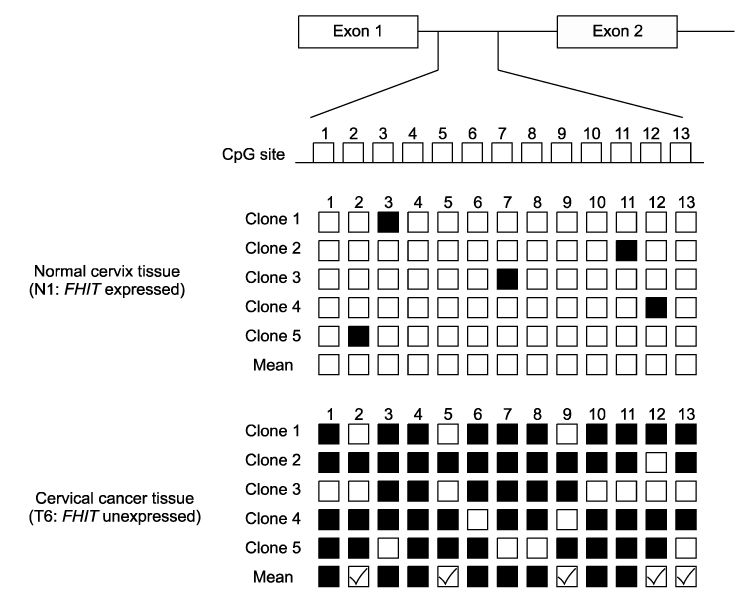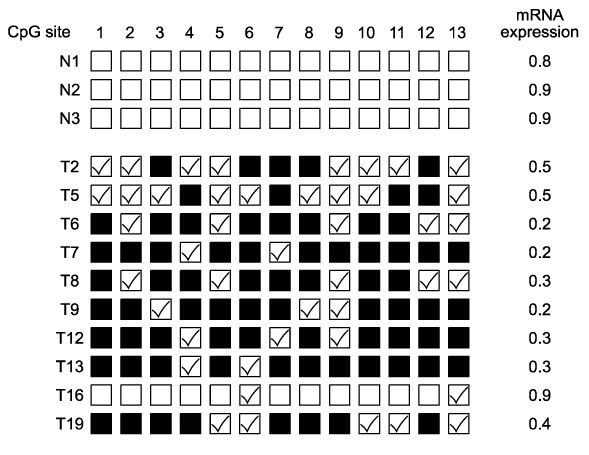J Gynecol Oncol.
2008 Jun;19(2):117-122. 10.3802/jgo.2008.19.2.117.
Role of 5'-CpG island hypermethylation of the FHIT gene in cervical carcinoma
- Affiliations
-
- 1Department of Obstetrics and Gynecology, East-West Neo Medical Center, Kyung-Hee University, Korea. leeobgy@yahoo.co.kr
- 2School of Life Sciences and Biotechnology, Korea University, Seoul, Korea.
- KMID: 2129911
- DOI: http://doi.org/10.3802/jgo.2008.19.2.117
Abstract
-
OBJECTIVE
The abnormal expression of fragile histidine triad (FHIT) gene has been frequently reported in a variety of epithelial malignancies including cervical carcinoma. Furthermore, in a recent study it was proposed that transcriptional inactivation of FHIT, as a consequence of aberrant 5'-CpG island methylation, plays an important role in the carcinogenesis of human cervical carcinoma. The authors sought to determine whether abnormal FHIT transcription occurs in human cervical carcinoma, and if so, whether this abnormal expression is associated with aberrant 5'-CpG island methylation. In addition, the clinical significance of FHIT inactivation was investigated in Korean women with cervical cancer.
METHODS
To examine for abnormal transcripts of the FHIT gene, quantitative RT-PCR, genomic DNA-PCR and nonisotopic RT-PCR-SSCP analysis were performed using the standard method. The methylation status was determined by methylation specific PCR and bisulfite DNA sequencing.
RESULTS
The FHIT gene was down-regulated in 15 of 58 (25.9%) cervical carcinomas. FHIT promoter hypermethylation was detected in 15 of 15 (100%) abnormally expression in cervical carcinomas. Bisulfite DNA sequencing confirmed these findings and a significant correlation was found between CpG site hypermethylation and low FHIT expression. However, no significant correlation was found between reduced FHIT expression and clinicopathological characteristics.
CONCLUSION
In this study, FHIT inactivation in cervical cancer was found to be strongly correlated with 5'-CpG island hypermethylation rather than a genetic alteration. Furthermore, no significant relation was found between a lack of FHIT expression and the prognostic factors of cervical cancer in our Korean cohort.
MeSH Terms
Figure
Reference
-
1. Shin HR, Jung KW, Won YJ, Park JG. 2002 Annual Report of the Korea Central Cancer Registry: Based on registered data from 139 hospitals. Cancer Res Treat. 2004. 36:103–114.2. Waggoner SE. Cervical cancer. Lancet. 2003. 361:2217–2225.3. Chen Q, Lipkina G, Song Q, Kramer RH. Promoter methylation regulates cadherin switching in squamous cell carcinoma. Biochem Biophys Res Commun. 2004. 315:850–856.4. Baylin SB, Herman JG, Graff JR, Vertino PM, Issa JP. Alterations in DNA methylation: A fundamental aspect of neoplasia. Adv Cancer Res. 1998. 72:141–196.5. Costello JF, Fruhwald MC, Smiraglia DJ, Rush LJ, Robertson GP, Gao X, et al. Aberrant CpG-island methylation has non-random and tumour-type-specific patterns. Nat Genet. 2000. 24:132–138.6. Naylor SL, Johnson BE, Minna JD, Sakaguchi AY. Loss of heterozygosity of chromosome 3p markers in small-cell lung cancer. Nature. 1987. 329:451–454.7. Hibi K, Takahashi T, Yamakawa K, Ueda R, Sekido Y, Ariyoshi Y, et al. Three distinct regions involved in 3p deletion in human lung cancer. Oncogene. 1992. 7:445–449.8. Ohta M, Inoue H, Cotticelli MG, Kastury K, Baffa R, Palazzo J, et al. The FHIT gene, spanning the chromosome 3p14.2 fragile site and renal carcinoma-associated t (3;8) breakpoint, is abnormal in digestive tract cancers. Cell. 1996. 84:587–597.9. Dumon KR, Ishii H, Vecchione A, Trapasso F, Baldassarre G, Chakrani F, et al. Fragile histidine triad expression delays tumor development and induces apoptosis in human pancreatic cancer. Cancer Res. 2001. 61:4827–4836.10. Maruyama R, Toyooka S, Toyooka KO, Virmani AK, Zochbauer-Muller S, Farinas AJ, et al. Aberrant promoter methylation profile of prostate cancers and its relationship to clinicopathological features. Clin Cancer Res. 2002. 8:514–519.11. Zochbauer-Muller S, Fong KM, Maitra A, Lam S, Geradts J, Ashfaq R, et al. 5' CpG island methylation of the FHIT gene is correlated with loss of gene expression in lung and breast cancer. Cancer Res. 2001. 61:3581–3585.12. Tanaka H, Shimada Y, Harada H, Shinoda M, Hatooka S, Imamura M, et al. Methylation of the 5' CpG island of the FHIT gene is closely associated with transcriptional inactivation in esophageal squamous cell carcinomas. Cancer Res. 1998. 58:3429–3434.13. Pekarsky Y, Palamarchuk A, Huebner K, Croce CM. FHIT as tumor suppressor: mechanisms and therapeutic opportunities. Cancer Biol Ther. 2002. 1:232–236.14. Shi HR, Wu QH, Suo ZH, Nesland JM. Correlation between methylation of 5'-CpG islands and inactivation of FHIT gene in cervical cancer. Ai Zheng. 2005. 24:7–11.15. Helland A, Kraggerud SM, Kristensen GB, Holm R, Abeler VM, Huebner K, et al. Primary cervical carcinomas show 2 common regions of deletion at 3P, 1 within the FHIT gene: Evaluation of allelic imbalance at FHIT, RB1 and TP53 in relation to survival. Int J Cancer. 2000. 88:217–222.16. Chu TY, Shen CY, Chiou YS, Lu JJ, Perng CL, Yu MS, et al. HPV-associated cervical cancers show frequent allelic loss at 3p14 but no apparent aberration of FHIT mRNA. Int J Cancer. 1998. 75:199–204.17. Tong SY, Lee SK, Chi SG. Abnormal fragile histidine triad (FHIT) expression in cervical carcinomas. Korean J Obstet Gynecol. 2004. 47:1093–1099.18. Ehrlich M, Jiang G, Fiala E, Dome JS, Yu MC, Long TI, et al. Hypomethylation and hypermethylation of DNA in Wilms tumors. Oncogene. 2002. 21:6694–6702.19. Barnes LD, Garrison PN, Siprashvili Z, Guranowski A, Robinson AK, Ingram SW, et al. FHIT, a putative tumor suppressor in humans, is a dinucleoside 5',5'''-P1,P3-triphosphate hydrolase. Biochemistry. 1996. 35:11529–11535.20. Velickovic M, Delahunt B, Grebe SK. Loss of heterozygosity at 3p14.2 in clear cell renal cell carcinoma is an early event and is highly localized to the FHIT gene locus. Cancer Res. 1999. 59:1323–1326.21. Choi CH, Lee KM, Choi JJ, Kim TJ, Kim WY, Lee JW, et al. Hypermethylation and loss of heterozygosity of tumor suppressor genes on chromosome 3p in cervical cancer. Cancer Lett. 2007. 255:26–33.22. Herman JG, Graff JR, Myohanen S, Nelkin BD, Baylin SB. Methylation-specific PCR: A novel PCR assay for methylation status of CpG islands. Proc Natl Acad Sci U S A. 1996. 93:9821–9826.23. Birrer MJ, Hendricks D, Farley J, Sundborg MJ, Bonome T, Walts MJ, et al. Abnormal FHIT expression in malignant and premalignant lesions of the cervix. Cancer Res. 1999. 59:5270–5274.24. Nakagawa S, Yoshikawa H, Kimura M, Kawana K, Matsumoto K, Onda T, et al. A possible involvement of aberrant expression of the FHIT gene in the carcinogenesis of squamous cell carcinoma of the uterine cervix. Br J Cancer. 1999. 79:589–594.25. Capuzzi D, Santoro E, Hauck WW, Kovatich AJ, Rosato FE, Baffa R, et al. FHIT expression in gastric adenocarcinoma: Correlation with disease stage and survival. Cancer. 2000. 88:24–34.26. Lee JI, Soria JC, Hassan K, Liu D, Tang X, El-Naggar A, et al. Loss of FHIT expression is a predictor of poor outcome in tongue cancer. Cancer Res. 2001. 61:837–841.27. Lee EJ, Lee BB, Kim JW, Shim YM, Hoseok I, Han J, et al. Aberrant methylation of Fragile Histidine Triad gene is associated with poor prognosis in early stage esophageal squamous cell carcinoma. Eur J Cancer. 2006. 42:972–980.28. Guerin LA, Hoffman HT, Zimmerman MB, Robinson RA. Decreased fragile histidine triad gene protein expression is associated with worse prognosis in oral squamous carcinoma. Arch Pathol Lab Med. 2006. 130:158–164.29. Toledo G, Sola JJ, Lozano MD, Soria E, Pardo J. Loss of FHIT protein expression is related to high proliferation, low apoptosis and worse prognosis in non-small-cell lung cancer. Mod Pathol. 2004. 17:440–448.30. Krivak TC, McBroom JW, Seidman J, Venzon D, Crothers B, MacKoul PJ, et al. Abnormal fragile histidine triad (FHIT) expression in advanced cervical carcinoma: a poor prognostic factor. Cancer Res. 2001. 61:4382–4385.31. Yoon SO. Abnormal fragile histidine triad (FHIT) expression in invasive cervical adenocarcinoma: Association with tumor aggressiveness. Hum Pathol. 2007. 38:326–331.32. Huang LW, Chao SL, Chen TJ. Reduced FHIT expression in cervical carcinoma: Correlation with tumor progression and poor prognosis. Gynecol Oncol. 2003. 90:331–337.33. Ren CC, Miao XH, Yang B, Zhao L, Sun R, Song WQ. Methylation status of the fragile histidine triad and E-cadherin genes in plasma of cervical cancer patients. Int J Gynecol Cancer. 2006. 16:1862–1867.
- Full Text Links
- Actions
-
Cited
- CITED
-
- Close
- Share
- Similar articles
-
- Abnormal Fragile Histidine Triad (FHIT) Expression in Cervical Carcinomas
- Promoter hypermethylation and loss of heterozygosity of FHIT genes in squamous cell carcinoma of uterine cervix
- CpG Island Hypermethylation in Gastric Carcinoma and Its Premalignant Lesions
- DNA Methylation Changes in Human Cancers
- Expression of Fragile Histidine Triad (FHIT) Gene Product in the Uterine Cervical Carcinoma





